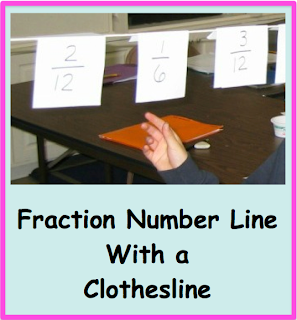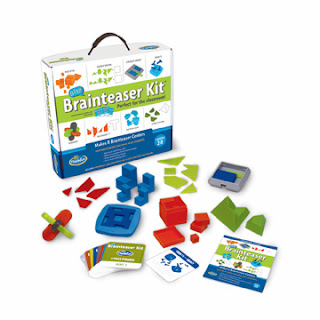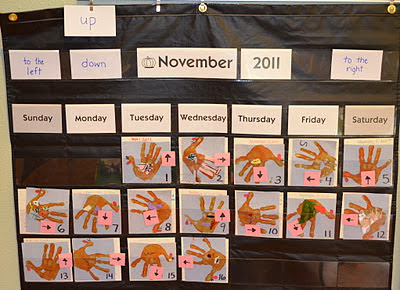What do Home Depot, fractions, and clotheslines have in common?
My classroom!

Inspired by Jeffrey Frykhom's Book,
Learning to Think Mathematically With the Number Line (now FREE!), I purchased a retractable clothesline from Home Depot and installed it in my classroom.
 Fraction Warm-Up
Fraction Warm-Up
Over the last couple weeks, my math class has been looking at how money and clock models can be used to make sense of fractions. In today's warm-up, I wanted to do a quick review of the fractions that we've used in our clock models.
Fraction Number Line Activity
I strung the clothesline across the room and explained the "rules" of the activity:
1. The activity is done in silence. The exception is explained in #3 below.
2. You will receive a fraction. When you get a tap on the shoulder, place the fraction where you think it goes on the number line. If you're really stuck, you can tap another student to come help you. (Still in silence.)
3. When it's your turn, you can move fractions if you think they belong elsewhere. You must justify your answer. (The only time you get to talk!) For example, you might explain where you think the number goes in proximity or sequence with other numbers. Or you might refer to the clock, reflecting on how many minutes would occur in that fraction of an hour.
4. Layer equivalent fractions on top of one another.
 |
| Getting started with the number line |
Reflections & Differentiation
Students, in rapt attention, worked to figure out their fractions and watched as classmates posted new ones. For some, calculating where to put their fraction proved to be a nice challenge. For others, a higher-level challenge lay in recognizing where the number line wasn't working. I heard comments like:
- The 1/2 needs to be exactly at the center (and other position comments.)
- You need to reverse these because... (this is less/more than the one next to it...and then they proved it.)
- These are equivalent because... (demonstrated proof)
The depth of the activity hugely contributed toward differentiation.
 |
| Moving a fraction...then explaining why two fractions are equivalent |
Reviewing Fractions of an Hour
After all the cards were posted, I started at zero and picked up one card at a time, asking students to figure out what fraction of an hour the number represented. So, for example, for 1/12, students said 5 minutes. For accountability, I usually had them whisper the answer to their neighbor before I asked for a volunteer to give an answer and justify it. When we reached a stack of fractions on the number line, I asked them to explain why they thought the numbers were equivalent.
 |
| Showing a pattern...in this case, noticing that 12ths can be found in order. |
Seeing Patterns in the Number Line
As we wrapped up, one student noticed a pattern...that all the 12ths--1/12, 2/12, 3/12, etc...--were in order on the line. Another student lit up, noticing the fourths. Then another saw the thirds.
This clothesline is going to see a lot more
laundry fractions!
P.S. For a single student, try
Clothespin Fractions.





































